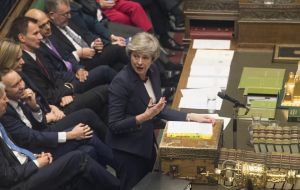MercoPress. South Atlantic News Agency
Theresa May and Parliament in their Brexit labyrinth
 Mrs May must submit a new plan for Britain's next steps by January 21. It is not clear what Mrs May's 'Plan B' is
Mrs May must submit a new plan for Britain's next steps by January 21. It is not clear what Mrs May's 'Plan B' is  Mrs. May has repeatedly emphasized that any attempt to prevent it from meeting its legal obligation to deliver an orderly EU exit would be extremely concerning
Mrs. May has repeatedly emphasized that any attempt to prevent it from meeting its legal obligation to deliver an orderly EU exit would be extremely concerning British Prime Minister Theresa May is facing likely defeat in Parliament when she asks MPs to approve her Brexit deal this Tuesday. That result would trigger huge uncertainty about the future of Britain's exit from the European Union.
Mrs May has warned that rejecting her deal opens up the possibility of Brexit being stopped, or that Britain leaves disruptively without a deal.She has promised to respond quickly to any defeat.
So what could happen next if she loses? There are several possible outcomes.
a) Mrs. May could resign as leader of the Conservative Party, triggering an internal contest to replace her without a general election. But remember, she defeated an attempt to oust her as leader of the Conservative party in December, winning a confidence vote by 200 votes to 117.
The result means her position as leader of the party is assured until the end of 2019, as she cannot be challenged for 12 months.
b) The opposition Labour Party has said it will call a vote of no confidence in the Government if Mrs. May deal is rejected, but has not specified exactly when.
If a majority of MPs vote against Mrs May's Government, Labour would have 14 days to prove, by a vote, that it could command a majority and form its own government. That would allow Labour to take control of the country without going to an election.
c) but if Mrs. May's Government loses a confidence vote and Labour is unable to form a new government, an election is called.
Mrs May could also call a general election herself if two-thirds of MPs in Parliament agree to it, though she has said that a general election is not in the national interest.
d) Mrs May must submit a new plan for Britain's next steps by January 21. It is not clear what Mrs May's 'Plan B' is, but some British media have reported she would ask Parliament to vote again on the deal, perhaps after seeking another set of reassurances from the EU.
Some MPs have floated the idea that Parliament could, in a temporary break from convention, take control of the process away from the Government and hand it to a committee of senior MPs from across the political spectrum.
It is not clear that this plan is technically possible, or whether it has enough support to succeed.
In effect the government has repeatedly emphasized that any attempt to prevent it from meeting its legal obligation to deliver an orderly EU exit would be extremely concerning.
e) The route to a second referendum on Brexit — or a people's vote — is unclear. But, unless the plan to give control of the process to Parliament is successful, it would require the backing of the Government of the day. A new referendum can be called only if it is approved by Parliament.
With Mrs May strongly opposed to a second referendum, and the opposition Labour Party not committed to one (but not ruling one out), a second referendum would need either a change in prime minister, a change in government, or an abrupt change in policy.
An increasingly vocal contingent of MPs from across the political spectrum supports a fresh vote to break the impasse in Parliament.
But so far they have not been able to prove there is a majority in Parliament that backs the view. Even if Parliament did agree in principle to a second referendum, Britain would then have to ask for an extension to its timetable for leaving the EU.
Finally the Government could seek to extend the negotiating period with the EU to give it time to try to reach a better deal, hold a general election, or conduct a second referendum.
The UK is scheduled to leave the EU at 11:00pm (local time) on March 29 under the current divorce terms.
The Government could also withdraw its notice of intention to leave the EU, which the European Court of Justice has ruled it can do without consent of other EU countries.
Mrs May has said she does not want to delay Britain's exit from the EU, and will not revoke the notice of intention to leave.




Top Comments
Disclaimer & comment rulesCommenting for this story is now closed.
If you have a Facebook account, become a fan and comment on our Facebook Page!